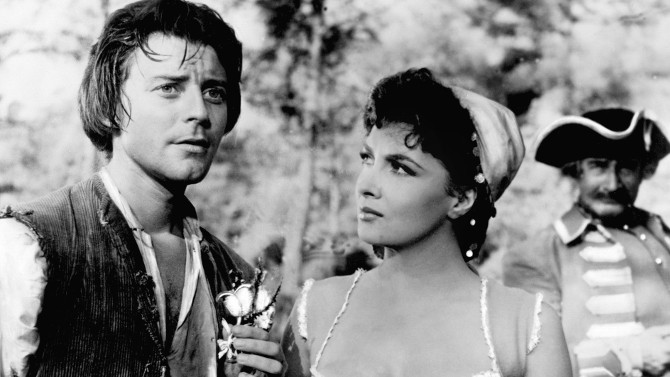A swashbuckling tale of adventure, romance, and intrigue, Fanfan la Tulipe (1952), directed by Christian-Jaque, found its way to me rather serendipitously – a thirty-three dollar Criterion feature tucked in the back of a country thrift shop (price tag – two bucks). Following the titular character, played by Gérard Philipe, as he gets embroiled in one scenario after another, mostly thanks to his fortune having been told, this occurrence helps form his unorthodox path (more on that later). . . I must say that it seems rather funny that I found this one in a place wholly unexpected, especially since the film deals with fate and destiny.
Played with a comedic spin, the story is set during the Seven Years’ War, and as the voice over (narrated by Jean Debucourt) puts it: “war, the only recreation of kings which the people could enjoy. . .the regiments of Picardy, Aquitaine and Burgundy fought elegantly, killing each other with grace, disemboweling in style. . . His Majesty’s soldiers found this war so pleasant that they made it last seven years”.
Fanfan is a bit of a dirty dandy, a soft footed prancer and swordsmith (both in the fighting sense and below the belt), who spends most of his time roaming the countryside, brashly bedding young women who lack confidence and self esteem. Caught in the act one fine day, a posse of rural townsfolk surround the man. . . the teenage girl’s father making sure that he will reap what he sows.
Marched into the city to be married to the young lass, a shapely fortuneteller, Adeline La Franchise (Gina Lollobrigida), chats him up on the side of the road, telling him that he will one day marry King Louis the XV’s daughter, and have much financial success. Blinded by the futuristic vision, the slippery fellow escapes and enlists in the army under La Franchise (Nerio Bernardi) – only after finding out that this vision the woman promised was a trick to get men to enlist (she is actually his daughter).
Joining other troops in training, Fanfan immediately bumps heads with second in command Fier-à-Bras (Noël Roquevert), a cocky, far reaching military man who has long courted Adeline. . . though the new recruit does make a lifelong friend in Tranche-Montagne (Olivier Hussenot), as the fleet of foot swashbuckler is able to rescue his son from a fiery explosion.
Packed with exquisite stunts and action set pieces, and shot with gorgeous black and white cinematography by Christian Matras (also the director of photography for Jean Renoir’s iconic 1937 picture Grand Illusion), Fanfan finds himself unknowingly rescuing the Princess he so desires to marry, receiving both a kiss and diamond studded tulip (the genesis of his nickname) from the royal dame and Madame de Pompadour – further evidence for the supposedly phony prediction made by Adeline.
Of course, as fate would have it, the troops are soon stationed just outside the King’s castle, temptation for the bold man. Beholden to the phony words she once uttered, Fanfan gets involved in countless situations, which leads Adeline into her own sticky conundrums. Let us not forget Louis XV (Marcel Herrand), the pompous royal with too much time on his hands. . . for he too finds his way into the lively tale. Will Fanfan survive the extended hostilities? If so, will he find love. . . and will it be with who he expects?
The winner of Best Director at the Cannes Film Festival and the Silver Bear at the Berlin Film Festival, Fanfan La Tulipe was a box office success upon its release (the highest grossing film of the year in France and sold to fifty plus countries). Both lighthearted and action packed, romantic and adventurous, it is a farcical look at 18th century military life with plenty of Douglas Fairbanks Sr. style stunts thrown in. Though it is not all fluffy filling, lingering just below the surface is both an anti-war and anti-royal message (you should sense it from the voice over mentioned in the opening paragraph). Intriguingly, these are the types of films that became quite passé soon after with the coming of the French New Wave – railed against by the young up and comers, these lavish, crowd pleasing quasi-copies of American films have somewhat been lost to time, despite the fact they have not lost any of their excitement and flair. Though not the most dynamic, thought provoking feature, it is light on the soul, a fun one hour, forty-two minute romp that leaves you pleasantly satisfied upon completion. And, it rides upon stars Philipe and Lollobrigida, the former’s own personality fusing with his character – thriving despite being injured twice during major set pieces (his effervescent joie de vivre more than palpable onscreen), while the latter exudes beauty, charm, spunk, and class – a vision to behold. Sadly, Philipe died just shy of his thirty-seventh birthday of liver cancer (likely one of the reasons he is not better known in North America today). The pair, along with the rest of the cast, deliver splendid performances, thriving on the rich dialogue, lavish sets and period costumes. Funnily enough, Adeline wears a rather low cut dress throughout, eye candy that not only the audience but also Fanfan notices, slyly remarking on it while gazing at her from the rooftop – “there’s a lovely valley between those hills”. With cheeky dialogue, amazing action and a jaunty story (the music by Maurice Thiriet and Georges Van Parys is perhaps best described by this word as well), hopefully this French film will serendipitously finds its way into your collection – and I promise you, no fan service here.
This film is in French with English subtitles

